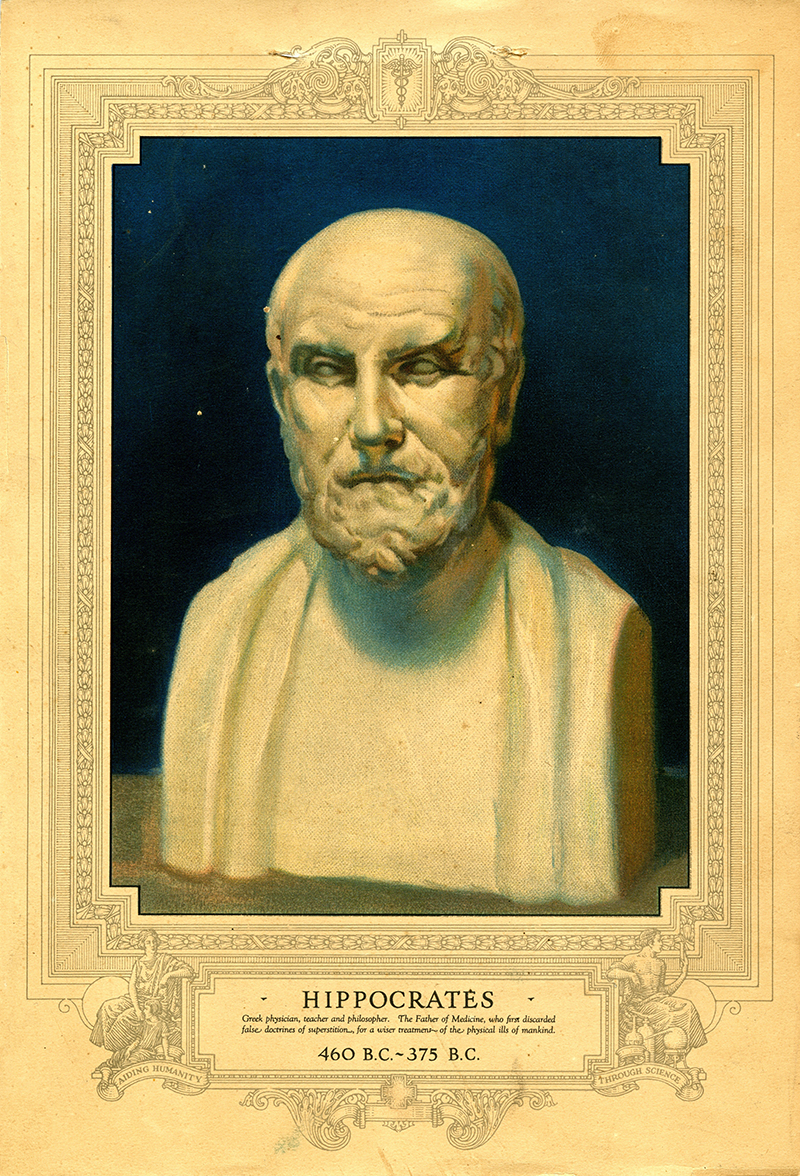Aphorismorum Hippocrates sectiones septem. Translated and edited by Francois Rabelais. Lyon, 1543.
— [Aphorisms] Greek text edited by Francois Rabelais. Lyons, Sebastien Gryphe, 1532.
— The genuine works of Hippocrates. Translated from the Greek with a preliminary discourse and annotations by Francis Adams. London: Printed for the Sydenham Society: C. and J. Adlard, Printers, 1849.
 Known as the “Father of Medicine”, Hippocrates was then as now a very famous healer [physician in the modern sense was probably unknown in ancient Greece] of the ancient Greek world. He taught medicine at Cos, and was an Asclepiad, which has been defined by historians as either a guild of physicians or simply a term applied to all physicians of his day. His major contribution to the field of medicine was to separate it from its former association with magic by no longer accepting that the gods are responsible for all disease. Instead, Hippocrates allowed observation, rationality and his own genuine respect for his patients to guide his practice (Garrison 94). Using the scientific method, he carefully recorded his patient’s symptoms and responses to treatments, and used the data gathered to evaluate and prescribe the most successful regimens. His prestige as a great medical practitioner, educator, and author helped spread these ideals of rational medicine throughout the ancient world.
Known as the “Father of Medicine”, Hippocrates was then as now a very famous healer [physician in the modern sense was probably unknown in ancient Greece] of the ancient Greek world. He taught medicine at Cos, and was an Asclepiad, which has been defined by historians as either a guild of physicians or simply a term applied to all physicians of his day. His major contribution to the field of medicine was to separate it from its former association with magic by no longer accepting that the gods are responsible for all disease. Instead, Hippocrates allowed observation, rationality and his own genuine respect for his patients to guide his practice (Garrison 94). Using the scientific method, he carefully recorded his patient’s symptoms and responses to treatments, and used the data gathered to evaluate and prescribe the most successful regimens. His prestige as a great medical practitioner, educator, and author helped spread these ideals of rational medicine throughout the ancient world.
There are a substantial number of writings attributed to Hippocrates, but which ones he actually authored is matter of some uncertainty. For example, though he is the namesake of the “Hippocratic Oath”, a code of medical ethics which has been valued for centuries, many historians recognize that he may not be the true author. Some historians have speculated that his collection of works, or corpus, might actually be a compilation of works produced by many individuals at the Cos school that later became attributed to him alone. Such conventions were rather commonplace in the classical world. Nevertheless, it is acknowledged that he must have written at least a portion of the works in his collection. While creating the first English translation of Hippocrates works in 1849, the Scottish translator Francis Adams (1796-1861) attempted to identify and present in translation The genuine works of Hippocrates. He also includes those texts that research indicates to be very likely by Hippocrates. This is just one of the important editions of Hippocrates’ works held at the Reynolds-Finley Library.
Also at the Reynolds-Finley are several early Greek and Latin Hippocratic texts, including the 1532 Greek and the 1543 Latin editions of Francois Rabelais’ translations of the very popular ‘Aphorisms’, which consist primarily of Hippocrates’ clinical observations. The 1532 edition is the first Greek text of the ‘Aphorisms’, and his Latin translation is one of the earliest in that language (Garrison 100 & 196).
Adams, The genuine works of Hippocrates, p.25; Clendening, Source Book of Med. Hist., p.6; Dict. Sci. Bio. Vol 5-6, p. 419; Garrison, Hist. Med., 4th Edition, pp. 92-100, 196; Garrison & Morton , Med. Bib., 5th Edition, 14; Heirs of Hippocrates, 1, 5, 7.
Image: Hippocrates, Print Collection, Reynolds-Finley Historical Library.
